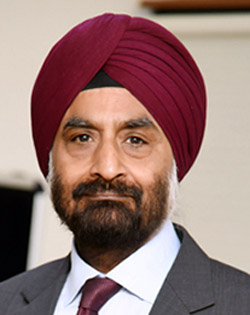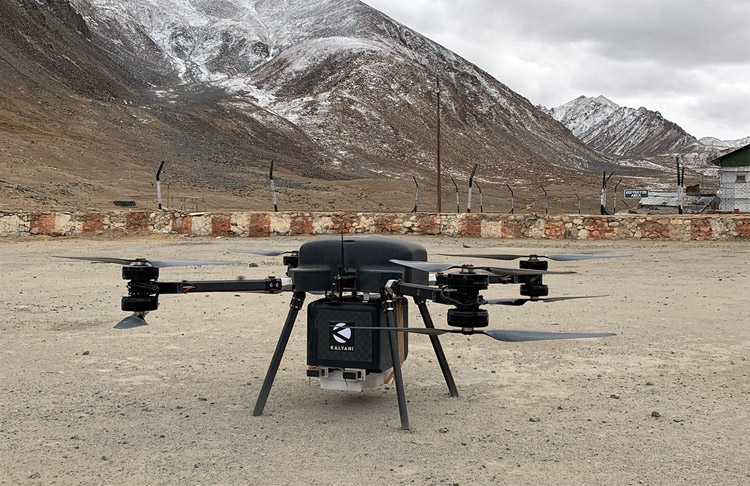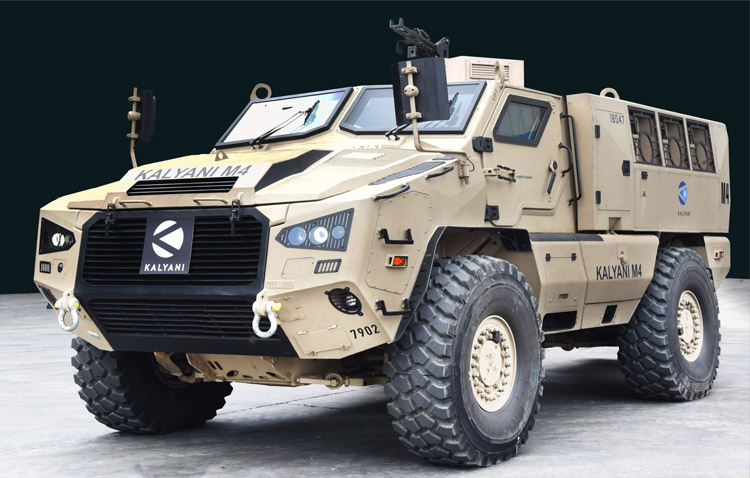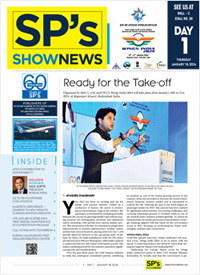- Prime Minister Narendra Modi inaugurates Aero India 2023 in Bengaluru; Releases Commemorative Stamp
- Defence Secretary meets delegations from Saudi Arabia, USA and Oman on the sidelines of Aero India 2023
- Foreign Ministers of 32 countries to attend Aero India 2023
- Embraer showcases the C-390 Millennium at Aero India 2023
Indian IP Weapon Systems is the way for 'Atmanirbharta'
On the sidelines of Aero India 2023, Rajinder Singh Bhatia, Chairman, Kalyani Strategic Systems Ltd. and President, Defence, Bharat Forge had a quick exclusive conversation with SP's ShowNews to share the group's journey in the Aerospace and Defence industry.

SP's ShowNews (SP's): From the large spectrum of offerings that the company provides, what would you say, are the major focus areas right now?
Rajinder Singh Bhatia (Bhatia): We as a group started to get into Defence & Aerospace about a decade ago and the focus was on various elements. On the defence side, we wanted to get into systems space which means making a full platform while on the aerospace side, the focus was to get into components, rotors which are high end of technology and then move on to sub-systems like turbochargers, and also get into small engines. Over the last three-four years, suddenly we have started to find a lot of traction. We have good visibility over the short and the medium term and there are a lot of initiatives which are fructifying in the long term. Over the last year, we have had significant success. We have especially advanced in the platform space and in the sub system space. So that is how the journey has been.
"We have a very good visibility, almost a four-figure order book and we believe that the next two to two-and-a-half years' order book is already there with us"
SP's: And how is this journey looking going forward?
Bhatia: We have a very good visibility, almost a four-figure order book and we believe that the next two to two-and-a-half years' order book is already there with us. All this is leading to the fact that we believe we are now in a position to operationalise a separate company which takes care of defence which I would be heading as the Chairman of the Board and the complete defence business will move into that particular segment. It is not a new company though, it is only going to become an overarching company for the defence business. Our philosophy, our business commitments do not change. It is just that this will draw more focus on the business and today.

SP's: Any particular segments that you would say are more in the spotlight?
Bhatia: We will be seeing good growth going into the future and the segments are continuously improving. As I mentioned, we started off with artillery guns, moved on to protected vehicles, then moved on to areas of munition and now we are looking at moving on in a big way to segments like missiles. We have a factory in Hyderabad that has been set up. We are hopeful that we will be getting into production for the Indian government's requirements on missile segments. Some airborne weapon platforms are also there. We are also discussing how to operationalise and manufacture a Spice series of loitering munitions, which is the one that was used in India's strike in Balakot. We have been manufacturing them but now we are looking at a complete solution to this. On the aerospace side we already have a number of collaborations like the recent one with General Atomics (GA) especially on the UAVs part where we will be doing the structures and some of the other items. We are also looking at signing some more agreements soon.
"We have always been at the forefront of 'Make in India'. All our technological developments in defence have purely been indigenous capability."
SP's: UAVs is an emerging technological advancement that the forces too are exploring extensively. Where do you place yourself in that?
Bhatia: We are not into commercial UAV segments. We wanted to focus on certain segments that are exclusive. So as of now, we are focusing on three. One is the Logistics UAVs which the armed forces required to be operational at a high altitude carrying 30-40 kgs of payload. In fact, as asked by the army, we are working on these. Second is on UAV based loitering munition which is a segment we are working on with the Defence Research and Development Organisation (DRDO). We have won the contract and we are working on it. And the third is to become partners to large players like GA who are into high altitude loitering UAVs and high altitude long endurance UAVs. In that segment we would like to be their manufacturing partner in the country, doing subsystems.

SP's: How has the 'Make in India' boost been for you?
Bhatia: We have always been at the forefront of 'Make in India'. All our technological developments in defence have purely been indigenous capability. We strongly believe that self-reliance or Atmanirbharta will only happen when Indian companies will have Indian Intellectual Property (IP). It can be appropriately realised only when Indian companies own Indian IP and weapon systems are made with the Indian IP which we see in service with the Indian Armed Forces. And we have been at the forefront of this, all our products basically are based on intellectual property which has been developed within the country and in places where we are dependent upon Foreign Original Equipment Manufacturers (OEMS), we go about signing agreements that IP would be available to us in India for Indian requirements.
"Nothing drives the business better than getting orders so the time period to get the orders needs to be shortened"
SP's: Sustainability is under large focus especially in Aviation? How do you see sustainability being a part of the defence industry?
Bhatia: There has been a lot of change in the way the Armed Forces used to look at industry for sustainability. Previously it would all be in-house, you would have your own Directors looking after the maintenance, upgrades and so on. Now, there has been a major change. Now, for some of our last supplied products the maintenance, the lifetime upgrades, everything rests with us. We, like most good Indian companies, can assure Indian customers and the Armed Forces that our commitment to provide sustainability to the weapon platform which we supply remains unshaken and it will be provided for whatever period they want. We will ensure not only to support their activities but to also do it in a real time by placing our maintenance team right upfront. For instance, today for our KM4 vehicles, we are creating maintenance teams right next to the place where the vehicles are being used, so that's our philosophy.
SP's: Any particular challenges that you might want to bring to notice?
Bhatia: Challenges will always be there. The government has done a lot in terms of policy framework, so we can't seem to be complaining. But we are looking at some more changes that can be brought in. One of the paramount ones is that nothing drives the business better than getting orders so the time period to get the orders needs to be shortened. If we go to a period of five-seven years, in many areas there will be technological obsolescence that will set in. So, to ensure that our Armed Forces get the latest state-of-the-art equipment, we need to cut down this acquisition cycle and that's the only prayer we have for the company, rest we are in a good space.





